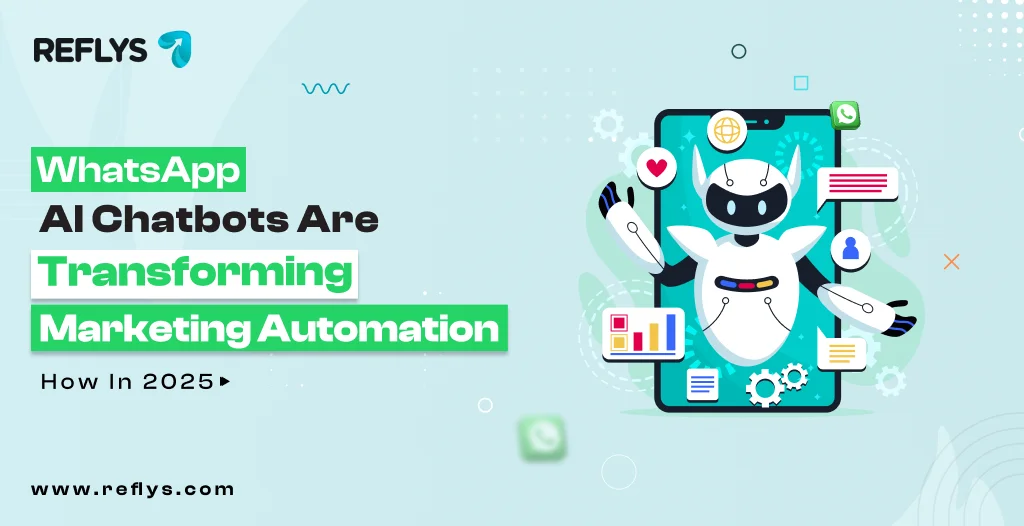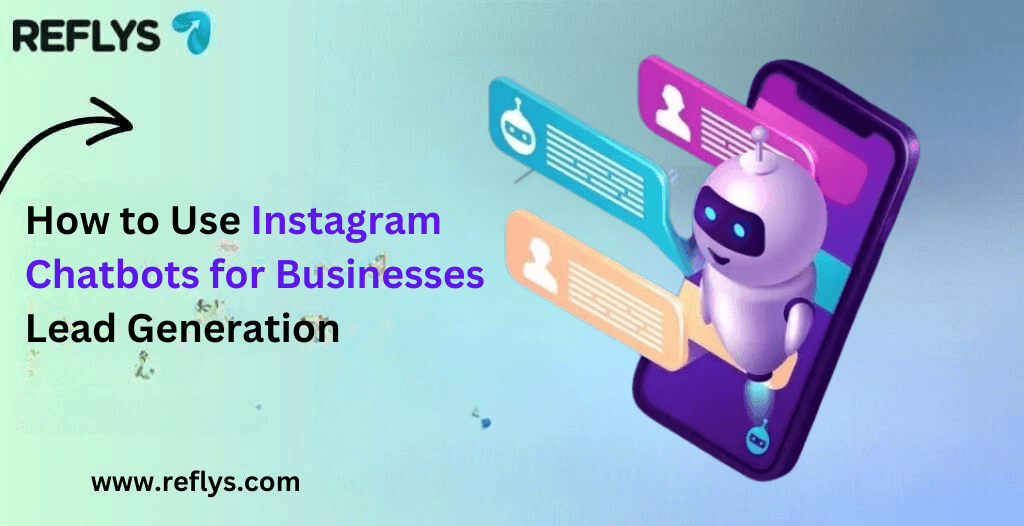How WhatsApp AI Chatbots Are Transforming Marketing Automation in 2025
The year 2025 is proving to be a turning point in marketing WhatsApp. Having more than 2 billion users on WhatsApp each month, it is no longer the place to chat with your personal friends; the platform has now become a potent marketing tool. Businesses are turning to automation to stay competitive, with AI-powered WhatsApp chatbots at the center of this transformation.
These chatbots are modifying the interaction between brands and their customers. They make conversations quicker, smarter and more personal. Whether responding to queries, providing updates, or making a sale, AI is assisting businesses to ensure a smoother experience to engage their customers.
In this blog, you’ll learn about WhatsApp AI automation, how important it is in 2025, how to use AI on WhatsApp, and the benefits it offers for both businesses and customers.

What is WhatsApp AI Automation?
WhatsApp AI automation refers to the use of artificial intelligence Chatbots to automatically handle customer service, marketing campaigns, and sales processes on WhatsApp.
- Traditional WhatsApp automation works with simple, rule-based replies. For example, if someone types “Hi,” they get an automatic “Hello, how can we help you?”
- AI-powered WhatsApp automation goes a step further. It interprets the meaning of questions, learns from conversation, and gives individualized responses. Rather than generic responses, it can suggest products, address problems, and even guide its customers through their complete purchase process.
AI introduces a layer of customization, knowledge, and scalability that traditional automation simply cannot perform.
Why WhatsApp Marketing Automation Matters in 2025
Consumer behavior is evolving rapidly. The modern customer does not want to wait hours or days to receive a reply; they want instant responses. Similarly, the pressure on brands is to achieve cost reduction and make operations more efficient.
These are the reasons why automation matters in 2025:
1. 24/7 Availability
In today’s always-connected world, customers may contact at any time, whether during the day, late at night, or even on weekends. By using WhatsApp AI automation, they will not spend hours waiting to get a reply. This continuous access ensures a feeling of trust and makes the businesses accessible whenever customers need them.
2. Faster Response Time
In digital communications, speed is everything. Using AI-based automation, customers get instant responses to their queries, such as product information, price, or delivery time. This quick exchange prevents drop-offs and keeps the conversation going, which is critical as the attention span starts to narrow.
3. Cost Efficiency
It may be costly to run a big customer care unit 24 hours a day. By automating messages and common queries, automation saves on a large workforce. Companies can then assign human resources to complicated cases and save money while providing quality services. This balance ensures smooth operations and higher cost-efficiency.
4. Higher Conversions
Sometimes a slight motivational push is necessary to get customers to buy something: a notification about their forgotten cart, a little discount, or a product recommendation. WhatsApp AI chatbots can deliver these messages at the opportune moment, convincing the users to take action. Such customized communications greatly enhance the possibility of converting interest to real sales
5. Stronger Customer Relationships
In addition to the rapid response, AI automation personalizes a conversation. It is capable of storing preferences, purchase history, and sending them updates that are specific to each customer. This will create the perception that the customers are being heard and valued, which will result in an emotional connection with the brand.
The Role of AI Chatbots in Transforming WhatsApp Marketing Campaigns
How to use AI on WhatsApp in real-time cases? So, let’s start by simplifying the process of chatbots by taking it step by step
1. Personalized Messaging at Scale
The AI chatbots are also capable of providing a product catalog on live chat from browsing history, buying patterns, or preferred choices of customers. Consider a fashion shop that recommends clothes based on what a client has previously purchased – this makes WhatsApp marketing messages seem less spammy and more of a personal shopping guide.
2. Automated Customer Support
Customers do not have to spend hours waiting in lines to get responses to frequently asked queries, updates on their orders, or even dealing with complaints. For example, questions such as where is my package? Can trigger a direct reply with live tracking news. This allows responses to be quicker and more reliable.
3. Lead Generation & Qualification
Chatbots can also ask simple questions such as, “What product are you looking for?” or “What’s your budget?” and automatically lead. These leads are then used with personalized follow-ups, which also eases the work of the sales team.
4. Boosting Conversions & Sales
AI chatbots notify clients about their abandoned carts, provide discounts, and recommend accessories. For example, when a buyer buys a phone, the bot can offer a case or a pair of headphones. These cross-sells enhance sales to the average order value.
5. Customer Retention
Customer retention is just as important as customer acquisition. Loyalty rewards, surveys and special offers can be delivered using WhatsApp bots with AI to capture their attention and convince them to purchase again.
How to Choose the Right WhatsApp AI Automation Tool?
Not every WhatsApp automation tool is equal. The right platform should also have the ability to address customer inquiries and to grow with your own business, being easily integrated with your existing systems and helping to provide a hassle-free customer experience. The following are the most important features to be taken into consideration before making a selection of a tool:
1. Natural Language Processing (NLP)
A chatbot can be as intelligent as it comprehends human interactions. NLP enables your WhatsApp AI chatbot to understand the customer messages just as a human would, even when the messages are written informally or with spelling errors. This makes the conversation more natural and not robotic, thus enhancing customer satisfaction
2. Scalability
Today, your business might only require a simple automation of FAQs, but what about after six months or two years down the line? An effective WhatsApp AI tool must be able to keep up with you, managing thousands of messages, multiple campaigns, and advanced workflows as your customer base expands. Opting to use a scaling platform spares you the burden of changing tools in the future.
3. Analytics and Reporting
You can’t improve what you don’t measure. Powerful analytics options allow you to monitor response time, engagement rates, conversion rate, and customer comments. These insights reveal what is working, where the customers are dropping off, and how your campaign performance may be refined to yield greater results. However, in the absence of analytics, you operate blindly.
4. Integration Capabilities
Your chatbot on WhatsApp should not operate in isolation. It should be compatible with your CRM, e-commerce systems, and payment gateways and even with your marketing tools. This enables you to automate end-to-end workflows to send order confirmations directly out of your store or capture leads directly into your CRM.
5. Ease of Use and Customization
The best tool is not the one that is difficult to operate. Find a tool with an easy interface, like Reflys, where you can create chatbot flows without any code. Moreover, it must be customizable to enable you to change the bot’s tone, personality, and responses to suit your brand.
6. Pricing and Value for Money
Price is a consideration at all times, although it is not necessarily about the cheapest thing. Analyze the pricing plan: a pay-per-message, a monthly subscription, or a tier-based plan and compare it with the features. An efficient tool must provide a high ROI through time savings, less support, and increased sales.
How to Measure the Success of WhatsApp Marketing Automation
These key performance indicators (KPIs) will help you know when your chatbot is performing:
- Time of response – Does the response take immediate action?
- Engagement rate- Are customers engaging with your messages?
- Conversion rate – Are leads converting to customers?
- Retention rate- Are customers returning?
In addition, review chatbot dialogues to identify holes and enhance processes. The continuous optimization ensures your automation with WhatsApp is effective in the long term.
Real Life Examples: How Businesses Use WhatsApp AI Automation
These are some practical applications of AI automation in WhatsApp business.
- E-commerce: Sending cart/abandonment alerts, confirmation, and delivery updates.
- Service companies: Boosting efficiency by using robots to remind of appointments, scheduling, and addressing service-related queries.
- B2B businesses: The strategy involves giving demos, proposals, and automatic follow-ups in nurture processes.
These examples indicate that AI chatbots are not restricted to large companies- small and medium-sized enterprises can also be successful.
Future of WhatsApp AI Chatbots in Marketing Automation
In the future, AI-powered chatbots on WhatsApp will be even more powerful in 2025 and further ahead. Here’s what to expect:
- Smarter personalization – Bots will understand emotions, context, and intent better.
- Voice + text chat – Customers will talk to bots naturally, just like voice assistants.
- Deeper integrations – WhatsApp chatbots will be integrated into CRM, e-commerce and payment systems.
Companies that adopt such innovations early will have a competitive advantage, and those that delay might lag
Conclusion
WhatsApp AI chatbots are transforming marketing automation in 2025 by making the customer journey more personal, efficient, and scalable. From generating leads to closing sales and retaining customers, automation allows businesses to do more with less effort.
If you’re running a business, now is the time to explore WhatsApp AI automation. The sooner you start, the sooner you’ll experience the benefits of smarter, faster, and more human-like conversations with your customers.


